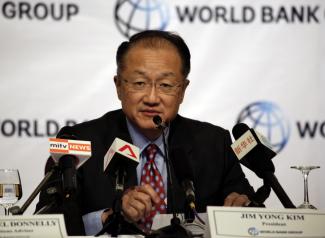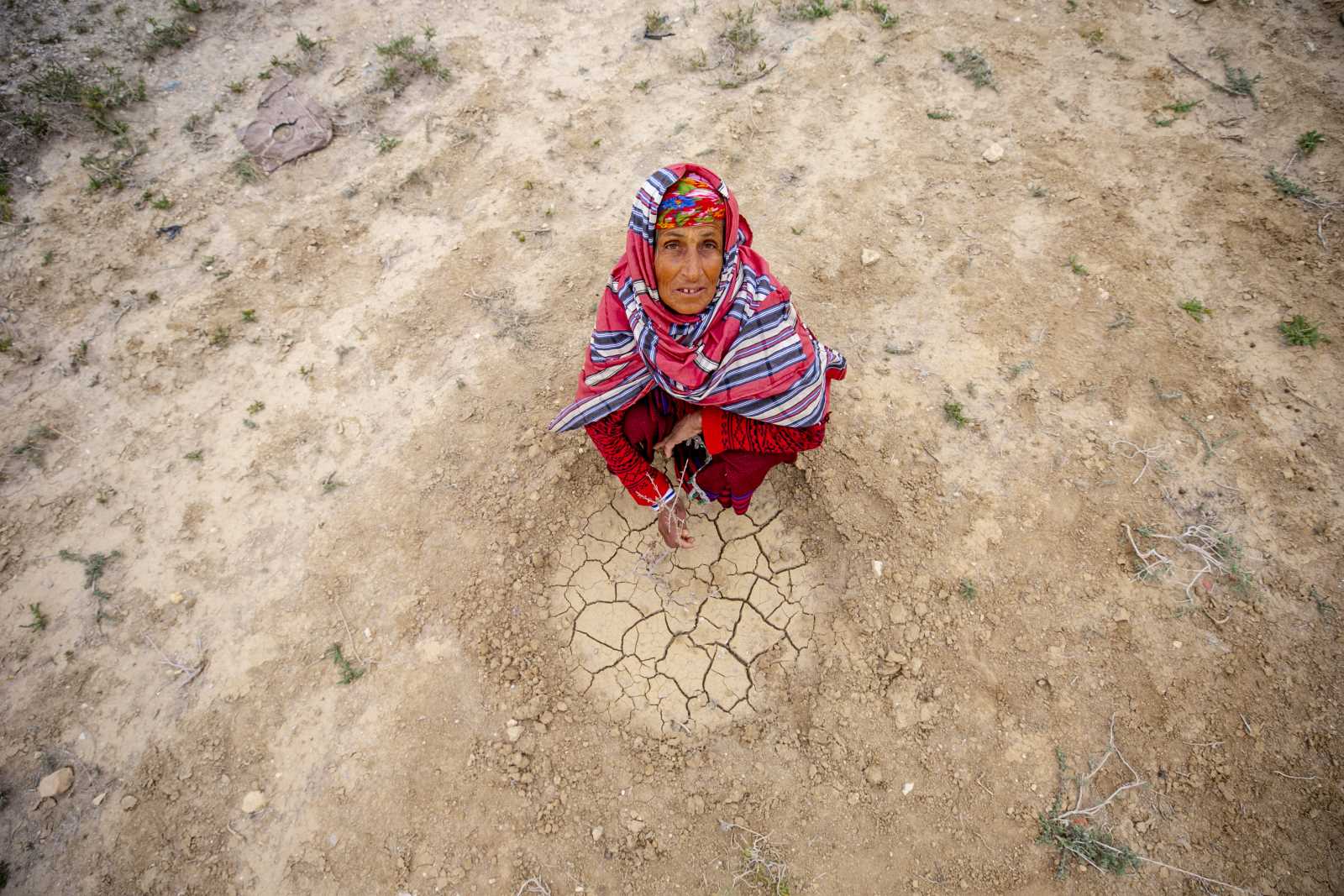World Bank
Reforming root and branch

With an eye to effectively achieving the new goals, working groups drafted a host of specific reform proposals for the World Bank Group in a participatory process. On that base, the Bank formulated a new strategy. It was the first one to consider the World Bank Group as a whole. The World Bank governors approved the strategy at the Annual Meeting in October 2013. Germany closely monitored and vigorously supported this realignment. The new strategy is now the basis for comprehensively restructuring the World Bank Group. The previous matrix structure will be transformed into one of "global practices".
Improved focus
The new goals imply that the World Bank Group needs to be more focussed. Reducing absolute and relative poverty remain the core objectives. In order to achieve the goal to cut extreme poverty to three percent of the world population by 2030 (and its interim target, which was defined later, to reduce that share to nine percent by 2020), it will be necessary, however, to do more than just maintain the development momentum of recent years. The World Bank’s research department calculates that, if recent trends only continue, extreme poverty will merely be reduced to eight percent of the world population by 2030. For the World Bank Group to achieve its goals, poverty therefore needs to be driven down much faster in the years ahead. Crucial issues are both growth and distribution.
The emphasis on "shared" prosperity means that income distribution will get more attention in the future. Regular reporting on how the incomes of the bottom 40 % develop and how they compare to the national average, in itself, should stimulate national and international debate and, hopefully, inspire policymakers.
At the same time, the World Bank Group itself must adapt its programmes to the new frame of reference. The goal of boosting growth as such, even with an implicit expectation of a trickle-down effect, can no longer be enough to justify a programme. The yardstick has to be the welfare of the bottom 40 % of the society concerned.
The World Bank Group wants to achieve the two goals of reduced poverty and shared prosperity in an environmentally, socially and fiscally sustainable manner. On the fiscal front, the institution can rely on established indicators e. g. for debt sustainability. However, for social sustainability, covering inclusion and broad-based participation in society, it will need to tread new paths. The same is true of environmental sustainability. One indicator in this regard is "national wealth", a broad measure of the national capital stock that also includes the stock of natural resources.
The new World Bank Group strategy stresses the need to pursue economic growth without breaching planetary boundaries. Accordingly, the World Bank Group will play a growing role in the protection of environmental global public goods, which transcend national-level development concerns.
In the context of environmental sustainability, Jim Yong Kim has so far placed special emphasis on climate change. That is evident, among other things, in "Turn down the heat", a series of reports the World Bank publishes in cooperation with the Potsdam Institute for Climate Impact Research. Moreover, climate-change mitigation and adaptation will enjoy a more prominent status in the realigned organisation due to the appointment of a vice president for climate change.
Greater development impact
The reforms are designed to boost the results orientation and thereby the development effectiveness of the World Bank Group’s operations. The respective catchphrase is "Solutions Bank". New criteria and procedures at the country-programmes level will ensure that the World Bank Group focuses on overcoming "binding constraints " that might obstruct progress towards the new goals.
The World Bank’s knowledge management will be upgraded as well. The idea is to improve the production, dissemination and application of knowledge. Middle-income countries, for instance, already especially appreciate the analytical and conceptual content of World Bank operations. Restructuring its organisation will allow the World Bank Group to make more effective use of its global presence, transferring experience and solutions from one world region to another.
At the same time, the Bank wants to improve its institutional learning, including learning from failure. In general, it plans to deal with past failures in a much more out-spoken way than it did in the past. Risk management is to be reconsidered with a focus on development impacts, and occasionally excessive risk aversion must end. As President Jim Yong Kim says: "The greatest risk may be taking no risk at all."
The new World Bank strategy is the first strategy to encompass the entire World Bank Group. It covers the International Bank for Reconstruction and Development (IBRD) and the concessionary International Development Association (IDA) as well as the Group’s two private-sector arms, the International Finance Corporation (IFC) and the Multilateral Investment Guarantee Agency (MIGA).
The new strategy is thus meant to create the "One World Bank Group", in which all member organisations will cooperate much more closely than at present. Among other things, that should result in promoting private sector development more effectively, notably by harnessing the private sector expertise of the IFC for IBRD/IDA operations. Moreover, significantly more private capital will be mobilised for development purposes through combining IBRD/IDA efforts to improve the regulatory environment with IFC investments or loans for private enterprise and MIGA insurance products for foreign investment.
Even an institution like the World Bank Group has only quite modest means in comparison to private-sector capital flows. Thus, it is crucially important to mobilise private capital and attract private investors to underpin development. That said, it is worth pointing out that the new strategy does not consider the private sector simply a source of capital. Rather, private sector development in itself is a necessary ingredient for sustainable poverty reduction.
After all, the additional jobs that are required will ultimately have to be created by private enterprises. Therefore, promoting private sector development is an important part of the World Bank Group’s mission. The private sector is a partner the Bank seeks exchange with.
The new strategy means the World Bank Group will also be more open to partnerships with other external actors. Ideas, concepts and knowledge will be sought from a broad spectrum of partners. At present, communication with the World Bank is often perceived by outsiders as a "one way street". The institution intends to change that. It has significantly intensified cooperation on various fronts already, for instance with the United Nations in fragile states (inter alia in Africa’s Great Lakes Region) and in the area of climate-change, where the World Bank is supporting the UNFCCC process, or with the GIZ in the field of knowledge management.
Conclusion
Given the sheer scale of the reform process, the journey on which the World Bank Group has embarked is not without risks. The new goals need to be made measurable; the organisation is being radically restructured, a new financial strategy is under development. Such comprehensive reform invariably produces friction and uncertainty. Nonetheless, the World Bank Group will be geared to contributing to poverty reduction in an even more targeted and more effective manner.
At the same time, the World Bank Group is stepping up its commitment to global public goods – an area in which, as a global institution, it is seen from
a German perspective to have a special responsibility. Accordingly, the World Bank Group is set to become an even more important partner for Germany. It is a suitable and increasingly important forum for effectively shaping international (development) agendas. What is more, a World Bank Group that is more open to cooperation with external partners will also create better opportunities for partnerships with German ones.
Ingrid-Gabriela Hoven is the Executive Director for Germany at the World Bank Group.
ihoven@worldbank.org
Martin Kipping is an advisor to the Executive Director for Germany at the World Bank Group and Director for Germany at the Caribbean Development Bank. The opinions expressed in this article are the personal views of the authors.
mkipping@worldbank.org













